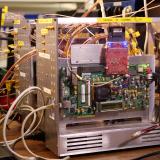In this demonstration, we address the hardware complexity challenge in a single-cell multi-user MIMO system, focusing on the task of estimating the underlying channel. In order to reduce the number of receive RF chains, we present a hardware prototype implementing analog combining for RF chain reduction. The prototype consists of a specially designed configurable combining board as well as a dedicated experimental setup. We adopt the Kronecker channel model with known second-order statistics of the channel (i.e., transmit and receive side covariance matrices), and show that the optimal combiner corresponds to the first eigenvectors of the receive side covariance matrix. Afterwards, the channel estimation with reduced receive RF chains is realized following a Bayesian approach, by applying the minimum mean squared error (MMSE) channel estimator to the output of our proposed analog combiner. The experimental study, which focuses on channel estimation accuracy in MIMO channels, demonstrates that using the proposed prototype, the achievable channel estimation performance is within a small gap in a statistical sense from that obtained using a costly receiver in which each antenna is connected to a dedicated RF chain. This prototype is developed at the Weizmann Institute of Science and was demonstrated at International Conference on Acoustics, Speech and Signal Processing (ICASSP) at Brighton, UK in May 2019.













